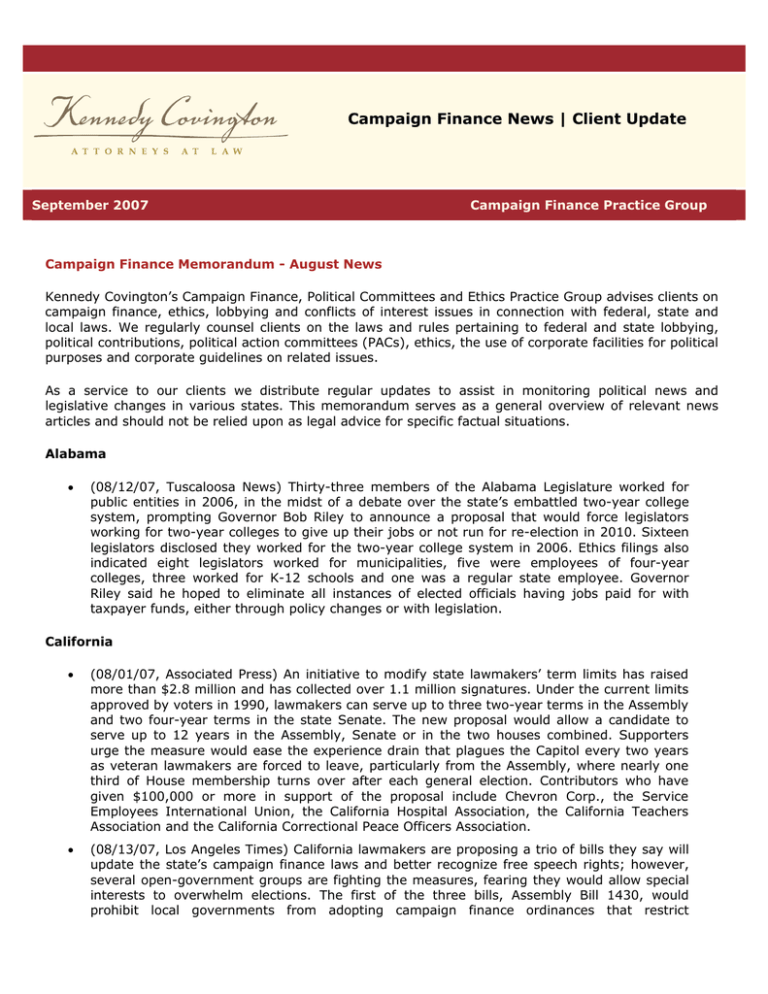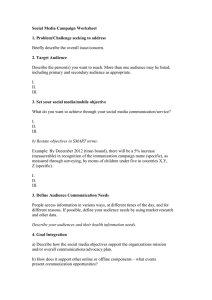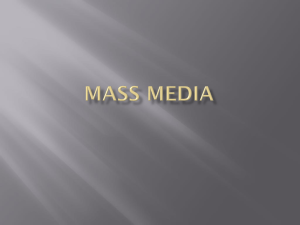Campaign Finance News | Client Update
advertisement

Campaign Finance News | Client Update September 2007 Campaign Finance Practice Group Campaign Finance Memorandum - August News Kennedy Covington’s Campaign Finance, Political Committees and Ethics Practice Group advises clients on campaign finance, ethics, lobbying and conflicts of interest issues in connection with federal, state and local laws. We regularly counsel clients on the laws and rules pertaining to federal and state lobbying, political contributions, political action committees (PACs), ethics, the use of corporate facilities for political purposes and corporate guidelines on related issues. As a service to our clients we distribute regular updates to assist in monitoring political news and legislative changes in various states. This memorandum serves as a general overview of relevant news articles and should not be relied upon as legal advice for specific factual situations. Alabama • (08/12/07, Tuscaloosa News) Thirty-three members of the Alabama Legislature worked for public entities in 2006, in the midst of a debate over the state’s embattled two-year college system, prompting Governor Bob Riley to announce a proposal that would force legislators working for two-year colleges to give up their jobs or not run for re-election in 2010. Sixteen legislators disclosed they worked for the two-year college system in 2006. Ethics filings also indicated eight legislators worked for municipalities, five were employees of four-year colleges, three worked for K-12 schools and one was a regular state employee. Governor Riley said he hoped to eliminate all instances of elected officials having jobs paid for with taxpayer funds, either through policy changes or with legislation. California • (08/01/07, Associated Press) An initiative to modify state lawmakers’ term limits has raised more than $2.8 million and has collected over 1.1 million signatures. Under the current limits approved by voters in 1990, lawmakers can serve up to three two-year terms in the Assembly and two four-year terms in the state Senate. The new proposal would allow a candidate to serve up to 12 years in the Assembly, Senate or in the two houses combined. Supporters urge the measure would ease the experience drain that plagues the Capitol every two years as veteran lawmakers are forced to leave, particularly from the Assembly, where nearly one third of House membership turns over after each general election. Contributors who have given $100,000 or more in support of the proposal include Chevron Corp., the Service Employees International Union, the California Hospital Association, the California Teachers Association and the California Correctional Peace Officers Association. • (08/13/07, Los Angeles Times) California lawmakers are proposing a trio of bills they say will update the state’s campaign finance laws and better recognize free speech rights; however, several open-government groups are fighting the measures, fearing they would allow special interests to overwhelm elections. The first of the three bills, Assembly Bill 1430, would prohibit local governments from adopting campaign finance ordinances that restrict communications between an organization and its members. Another measure, Senate Bill 298, would increase the contribution amount that triggers reporting requirements for large campaign donors. The third bill, Senate Bill 381, would reduce the disclosure of contributions made by supporters to charities and other nonprofit groups at the behest of politicians. Federal • (08/02/07, Roll Call) Freshman Democratic Senators have wasted little time revving up their own leadership committees to help boost candidate and party efforts. Reports show most of the freshman raised modest amounts for their PACs in the first six months of 2007. However, their early giving patterns reveal it did not take long for new senators to realize the value of having an extra financial vehicle to help their party retain and grow its majority. Leadership PACs were traditionally formed and used by party leaders, and those who wanted to become leaders, to spread money to candidates and curry favor with incumbents. In recent years, however, they have increasingly become a common vehicle for rank-and-file House and Senate members to aid their colleagues’ re-election campaigns. Incumbents can contribute up to $10,000 to other candidates through their PACs, whereas through their personal campaign committees they are limited to giving $4,000. • (08/02/07, Associated Press) The Senate voted to make lawmakers disclose more information regarding their efforts to fund pet projects and raise money from lobbyists. The bill would require lawmakers to disclose those lobbyists who raise $15,000 or more for them within a six-month period by “bundling” donations from many people. Additionally, lawmakers seeking targeted spending projects, or “earmarks,” would have to publicize their plans in advance. Opponents argue senators could circumvent the requirements by stating that prompt disclosure was not technically feasible, or by having the majority leader declare a bill earmark-free. The bill also requires senators, and candidates for the Senate or White House, to pay full charter rates for trips on private planes. House members and candidates are barred from accepting trips on private planes. Senators’ “holds” on legislation would be required to be disclosed as well, and lawmakers convicted of bribery and other serious crimes would lose their congressional pensions. • (08/16/07, USA Today) Democrats seeking the White House received more than four times as much money from some of the nation’s wealthiest enclaves as party contenders did in 2003. Major Democratic presidential candidates have raised nearly $32 million from 50 ZIP codes that were the top sources of campaign money in the first six months of the year. In contrast, Republicans received $13.8 million. Because fewer than one percent of all Americans donate to presidential campaigns, contributions from wealthy neighborhoods also highlight the influence that a small fraction of people will have on the contest. • (08/18/07, Arizona Republic) Top U.S. Commerce and Treasury department officials appeared with Republican candidates and contributed millions of dollars in federal money in battleground congressional districts after receiving White House political briefings detailing GOP election strategy. The U.S. House Oversight Committee is investigating the possibility of White House political briefings to at least 15 agencies, including the Justice Department, the General Services Administration (GSA) and the State Department, violating a ban on the use of government resources for campaign activities. Under the Hatch Act, Cabinet members are permitted to attend political briefings and appear with members of Congress but are prohibited from spending taxpayer money with the aim of benefiting candidates. In a separate investigation, the independent office of special counsel concluded GSA Administrator Lurita Doan violated the Act when she asked at the end of one political briefing in January 2007 what her agency could do to help GOP candidates. Doan has denied making the remark. Violations of the Hatch Act are treated as administrative, not criminal, matters and punishment for violations ranges from suspension to termination. • (08/18/07, Kansas City Star) A U.S. Justice Department corruption task force is investigating whether U.S. Representative Don Young (R-AK) accepted campaign contributions in return for 2 securing $10 million for construction of a proposed Florida highway ramp. The highway pet project is expected to produce large profits for a local real estate developer. It is among a number of congressional earmarks for specific pet projects drawing scrutiny from the Justice Department and an FBI team investigating alleged influence peddling on Capitol Hill. • (08/20/07, Hartford Courant) Congress passed sweeping reforms aimed at curtailing the influence of Washington lobbyists but watchdog groups see loopholes because of a lack of tough enforcement mechanisms. The House and Senate ethics committees are responsible for investigating potential violations of the new proposal, but some critics want an independent body to initiate and investigate possible ethics violations. Currently, ethics committee investigations are highly secret and enforcement action is rare. U.S. Senator Joe Lieberman (I-CT) met resistance from peers recently when he tried to establish an independent office to investigate possible violations. A House task force is studying ways to increase enforcement and is expected to produce recommendations later this year. FEC • (07/31/07, Charlotte Observer) House Republicans filed a complaint Monday with the FEC against the Biscoe school teacher who came close to unseating Representative Robin Hayes (R-NC). The National Republican Campaign Committee said Larry Kissell’s campaign filings “show a pattern of inaccuracies and misrepresentations.” Kissell reported $51,000 in debt in his two most recent disclosure filings. However, some of the reported sources of debt changed from one filing to the next. • (08/01/07, Associated Press) Democrat Christine Jennings’ congressional campaign failed to pay more than $23,000 in federal payroll taxes during a contentious race in which she hammered her Republican opponent for not paying his taxes. Jennings has since paid off the back taxes and now uses an outside company to handle her campaign payroll. She has also appointed a new campaign treasurer. • (08/17/07, Politico) The FEC fined a 527 group that aired ads during U.S. Senator Barack Obama’s (D-IL) 2004 Senate campaign, suggesting he “supported abortion even after the child was born alive.” The Commission found the Empower Illinois Media Fund failed to register with the FEC as a political committee and comply with federal contribution limits and reporting requirements. The group agreed to pay a $3,000 penalty and to retroactively report its expenses and contributors. • (08/29/07, Washington Post) An independent political group, America Coming Together (ACT), allied with Democrats and heavily funded by billionaire George Soros, has agreed to pay $775,000 to the FEC for violating campaign laws during the 2004 presidential campaign. The civil penalty is the third largest fine ever levied by the FEC. The Commission found that ACT inappropriately used money raised outside federal election limits to help federal candidates but rejected claims the group coordinated its activities with the Democratic National Committee or the presidential campaign of U.S. Senator John Kerry (D-MA). ACT was formed in 2003 by liberal and union-related activists as a response to the voter mobilization efforts of President Bush’s campaign. The group raised $137 million, much from Soros and the Service Employees International Union. The money was split between a PAC, which could spend money on federal candidates, and a separate organization set up under IRS rules that could raise unrestricted funds. Florida • (07/27/07, Tallahassee Democrat) The legal challenge to Florida’s 2005 lobbyist gift ban will continue. Lawyers for two lobbyists are appealing the decision by a state court judge in June to toss out their challenge on a law banning gifts to lawmakers and forcing lobbyists to report their income. Circuit Court Judge Terry Lewis ruled the law did not infringe on the privacy of 3 lobbyists and the public had a compelling interest in knowing who was being hired, who was hiring lobbyists, and how much principals were paying to lobby the Legislature. • (08/16/07, Tallahassee Democrat) With a new governor, the national group Environmental Defense has decided to make an impression in Florida. The organization financed a climate change summit where Governor Charlie Crist announced aggressive carbon reduction goals. It also spent at least $172,000 on lobbyists in the first half of 2007. The organization spent no money during former Governor Jeb Bush’s last year in office. • (08/24/07, Miami Herald) Democratic legislators appear to have committed more than 200 election-law violations, nearly all of them stemming from accepting campaign contributions above state limits. The Florida Elections Commission said that Florida House Victory, a fundraising committee set up by House Democrats in 2003, may have committed 209 violations that could trigger at least $200,000 in fines against those who ran the committee. The Commission spent 15 months investigating Democrats after a complaint was filed by Eric Buermann, an attorney who once worked for the Florida Republican Party. Since Florida House Victory no longer exists, the only person who could be fined is Jeff Ryan, a Democratic Party employee who was chairperson. State law caps contributions to candidates, and political committees that support candidates, at $500 from each individual donor. The Commission found Florida House Victory accepted donations far in excess of that amount, in one case taking a $50,000 check from the Palm Beach County Classroom Teachers Association. Georgia • (08/10/07, Atlanta Journal-Constitution) In the first half of 2007, more than 240 elected officials, including Governor Sonny Perdue and Lt. Governor Casey Cagle, failed to timely file reports detailing personal finances and campaign contributions. State politicians are required to file five reports disclosing contributions throughout an election year, sending one copy to the state and one their home county. In non-election years, they must file twice with both governments. Officials must also file an annual disclosure listing their personal finances and business interests aimed at letting Georgians know about possible conflicts-of-interests and who is funding campaigns. Government watchdogs blame small late fees for failure to disclose have helped create a culture in which serial violators can ignore campaign and personal disclosure laws because there are so few consequences. • (08/22/07, Atlanta Journal- Constitution) The Georgia Public Service Commission (PSC) voted to impose limits on private conversations with utilities and others with business before the agency. The new rule, which goes into effect in September, will prohibit such conversations during the final weeks of PSC deliberations, when all sides are trying to conclude settlement agreements. Lawyers and lobbyists will still be allowed to communicate with commissioners, but only if all parties are present or discussions are copied into written communication. Georgia was one of only two states that allowed lobbyists and lawyers to have private talks with commissioners while they deliberated cases. • (08/24/07, Atlanta Journal-Constitution) The Atlanta Board of Ethics is increasing enforcement of the city’s campaign finance and ethics code. The Board asked the city solicitor to prosecute current or former employees who failed to disclose mandatory financial reports or who missed the deadline. Four employees working for the Department of Watershed Management have already been fined $1,000. National • (08/27/07, Pew Center on the States) A growing number of lobbyists across the nation are turning a profit by lobbying state attorneys general, seeking to influence investigations pursued by the state and the outside help they hire. It is an area of lobbying that has received little attention and even less oversight at the state level. According to Colorado Attorney General John Suthers, lobbying of state law enforcers has become increasingly 4 common since 45 attorneys general in 1998 forced tobacco firms into a record $246 billion settlement over smokers’ health claims. This year, state attorneys general led consumerprotection investigations into multimillion-dollar settlements with large companies. Corporations, having a large stake in fending off such investigations even before they begin, have increasingly turned to lobbyists to explain the positions of the companies while avoiding making the kind of requests for a desired action that are more common with the legislative branch. • (08/31/07, New York Times) The Republican National Committee (RNC) will penalize at least five states holding early primaries, including New Hampshire and Florida, by refusing to seat at least half of their delegates at the national convention. Much of the focus in the primary scheduling fight up to now has involved the battle between the Democratic National Committee (DNC) and Florida because of the state’s decision to move up its primary. The action by Republicans and Democrats is a rare instance of the two parties moving in concert, in this case to regain control over a rapidly evolving primary calendar that has thrust the nominating system into deep uncertainty just months before it is to begin. Wyoming, Michigan and South Carolina also face sanctions for moving up their GOP primaries. Iowa and Nevada will escape sanctions because they hold nonbinding caucuses, not primaries. North Carolina • (08/01/07, Raleigh News & Observer) A lobbyist who represented nursing homes in the halls of the North Carolina General Assembly was charged with embezzling more than $200,000 from a PAC. Stacy Flannery was charged with one felony count of embezzlement after serving more than nine years as director of legislative affairs and treasurer of the North Carolina Health Care Facilities Association’s PAC. Flannery has been accused of taking $201,170 from the association. The Wake County district attorney’s office and Elections Board officials think Flannery embezzled the money while she was employed with the PAC between October 17, 2000, and March 16,2007, according to court records. • (08/09/07, WRAL) Governor Mike Easley signed three bills into law, amending current state campaign finance laws. Two bills change lobbying laws, in part by making investigative hearings of ethics panels open when executive branch officials and General Assembly members are accused in credible ethics complaints. The old State Board of Ethics held similar open hearings against executive branch members and appointees to state panels. However, revisions to campaign finance laws in 2006 made those meetings of the reconstituted State Ethics Commission confidential while the Legislative Ethics Committee, which handles complaints against lawmakers, remained closed. The third bill requires quarterly reporting to the North Carolina Board of Elections of donations and expenditures for legal defense funds. These funds received scrutiny following the establishment of accounts for former House Speaker Jim Black and ex-Speaker Pro Tempore Richard Morgan. The new law allows unlimited individual donations to these funds, but donations by corporations, unions and trade associations are capped at $4,000 per year. • (08/10/07, Wilmington Star) The North Carolina Ethics Commission removed two appointees from their positions and recommended removing three more because they failed to file a new economic disclosure form due more than five months ago under the state’s ethics law. Those five and fifteen others also received $250 fines. Last year, following a series of scandals that highlighted weaknesses in campaign finance and disclosure laws, the General Assembly passed expanded ethics laws and required more information to be disclosed to ensure that conflicts-of-interest were uncovered. The Commission mailed the Statement of Economic Interest form to more than 4,300 people covered by the new laws. The forms, due by March 15, were not filed on time by approximately 500 people. Despite letters warning of potential fines or removal, the Commission reviewed 39 cases in which people never filed their reports or filed excessively late. 5 Ohio • (08/24/07, Akron Beacon Journal) The debate between Secretary of State Jennifer Brunner and a Virginia-based PAC she alleges illegally funneled $870,000 to Republican supported of charter schools in Ohio last year was placed on hold for up to five weeks. The Ohio Election Commission asked lawyers for both sides to agree to a set of facts and file briefs in a case that both sides expect is bound for the courts. In May 2006, the Commission issued an advisory opinion to All Children Matter, cautioning against the transferring of funds to an affiliate PAC in Ohio without registering as an in-state PAC. Brunner contends that All Children Matter-VA PAC was not properly established under Ohio law, and the transfer of money to the Ohio PAC is not permitted because contributions exceed state limits. The organization, registered under the Internal Revenue Code as a 501(c)(4), used the money to contribute $91,000 to 29 Republican candidates for office in 2006 and spent almost $675,000 on independent expenditures, including direct mailings and radio advertisements. South Carolina • (08/03/07, PR Newswire) Two South Carolina businessmen pleaded guilty to causing numerous federal campaigns to make false statements to the FEC. David Collier and Robert Price III of Columbia, S.C., each pleaded guilty to one count of an information charge causing a false statement to be made. The two men face up to five years in prison, a fine of $250,000 and three years of supervised release. Both men admitted that, beginning in 1997, they worked with a tribe of Native Americans in South Carolina to operate a tribal gaming facility. To further the gaming interests of the tribe with certain federal officials, Collier and Price solicited and obtained campaign contributions totaling over $65,000 from friends, family members and business associates. Contributors were then reimbursed with tribal funds. These actions caused the campaign committees of the candidates and officials to unwittingly file false reports with the FEC listing the individuals as the contributors, rather than the tribe. • (08/09/07, New York Times) The South Carolina Republican Party moved up its primary to January 19, ahead of the Florida primary and setting the stage for more states to move up their primaries, pushing the nominating calendar into December and moving up the date of the New Hampshire primary. South Carolina was scheduled to hold its primary on February 2. South Carolina’s change also puts the date of the Iowa caucus in limbo—the state has a law stating its caucus must be held eight days before any similar contest, meaning the state would hold its caucus on January 4 at the latest because of the anticipated move of the date for the New Hampshire primary. Iowa Secretary of State Michael Mauro said there is debate as to whether the law is binding because political parties run the caucuses. Texas • (08/25/07, Austin American-Statesman) Five years after the Texas Association of Business (TAB) rounded up $1.7 million from corporations to influence the 2002 elections, a judge ruled the group and three officials face a civil suit for possibly violating state election laws. The companies that gave the money were dismissed from the lawsuit. At issue is whether TAB and its officials acted as a PAC and were subject to state election laws, which prohibit the spending of corporate money in connection with campaigns. In 2002, President Bill Hammond and his associates secretly solicited corporate money to pay for 4 million mailers sent to voters in 24 swing districts. Although state laws prohibit the use of corporate money in connection with campaigns, Hammond said he believed he could praise Republican candidates and attack Democrats as long as the mailers did not advocate the election or defeat of specific candidates. Hammond turned to corporate donors because it was easier than raising money from individuals. Two years ago, in a similar suit, the treasurer for Former U.S. Representative Tom Delay’s PAC was found to be in violation of state law by failing to disclose the corporate money the committee raised and spent to influence the 2002 elections. 6 This newsletter is published as a service to clients and others interested in campaign finance issues. The information provided herein is general in nature and should not be relied upon as legal advice as to specific factual situations. Our campaign finance, political committees and ethics practice group welcomes your comments or inquiries about this newsletter or about any specific matters you may wish to discuss with us. Campaign Finance, Political Committees and Ethics Practice Group James H. Hodges Jared D. Mobley Mack A. Paul IV William G. Scoggin Margaret R. Westbrook (chair) 803.251.2301 704.331.7535 919.743.7326 919.743.7327 919.743.7311 Celebrating our 50th anniversary, Kennedy Covington is one of the largest law firms in the Carolinas with offices in Charlotte, Raleigh, Research Triangle Park, Columbia and Rock Hill. Our more than 200 attorneys use their diverse experience and knowledge to counsel clients in varied industries such as banking and finance, real estate, technology, health care, manufacturing and the services sector. At Kennedy Covington, we give more than a legal opinion; we provide a business perspective. Kennedy Covington 4350 Lassiter at North Hills Avenue Suite 300 Raleigh, NC 27609 www.kennedycovington.com © Copyright 2007 Kennedy Covington 7





